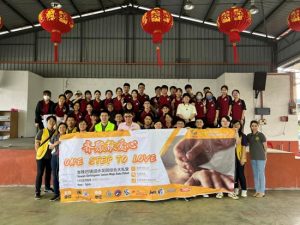
The Faculty of Health and Life Sciences (FHLS) at INTI International University hosted a Traditional Chinese Medicine (TCM) charity event at Dewan Serbaguna Taman Maju, Batu Pahat, on 17th December.
The purpose of the event was to expose students to practical firsthand skills by learning how to communicate with the public and supply treatment to the patients during the charity event.
FHLS also aimed to promote this event it as a Corporate Social Responsibility Program (CSR) for the university and at the same time to enhance the branding of the university.
Students were able to demonstrate the application of Chinese Medicine as part of the knowledge gained during lectures in INTI.
More specifically, the information they learned through TCM3201 Diagnostic of Chinese Medicine, TCM3203 Prescription of Chinese Medicine, TCM3207 Fundamental of Acupuncture, and TCM4208 Technique of Tuina courses.
This event helped students to improve their knowledge and practical skills in Traditional Chinese Medicine especially in the fields of diagnostic, acupuncture, Tuina, and prescribing medication to patients.
Traditional Chinese Medicine is an alternative treatment that provides practitioners with good practical skills and experience. Such charity events, can be part of clinical training programs for students and enables them to horne in on their skills.
This event was organized in is a collaboration with INTI TCM department, INTI TCM club, INTI Foundation, and Leo-Lions Club from Batu Pahat.
Several booths were set up and consisted of a registration booth, consultation station, acupuncture station, Tuina Station, product selling booth, and dispensary.
In the registration booth, the a student in charge was recorded the details of patients and helped to measure their blood pressure before continuing to the consultation station.
In the consultation station, students under the supervision of a supervisor learnt to diagnose the problem and the supervisors gave advice and instructions to the students, and students then drafted clinical reports by analyzing the cases.
Meanwhile, in the acupuncture and Tuina station, students also practiced their practical skills by supplying acupuncture and tuina therapy to the public under supervision.
In the product selling booth, the students sold herbal soaps, herbal tea bags, and some other products like ointments made from herbs. Lastly, the student in charge of the dispensary prepared the medication for the patients.
In total, fifty-one patients took part in the event.
